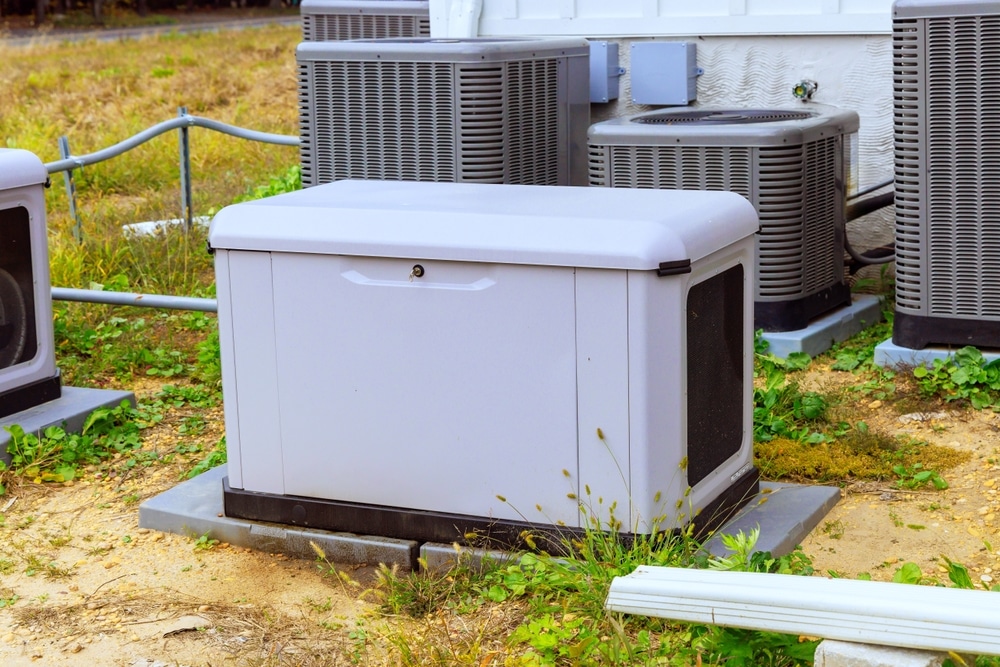
Power outages may strike at any time, disrupting your life. They can happen when you least expect it for many reasons, including grid failure, extreme weather conditions, and unusually high power demands.
When the power goes out, yours doesn’t have to. A standby generator can ensure that your home is always powered during blackouts and outages.
Keep reading to learn more about what a standby generator is, how it works, and why you should invest in one!
What is a Standby Generator?

A standby generator is a backup power solution that supplies electricity when utility power goes down. Within seconds of a power cut, a standby generator automatically kicks in and begins powering predetermined systems and appliances in your house, depending on its capacity.
A standby generator is usually installed permanently on a concrete pad outside your home. It operates on propane, natural gas, or diesel and stays on guard 24/7, ready for any power outage.
Standby generators come in different sizes, enabling you to select which of your home’s systems and appliances you want to power during an outage. Depending on your needs and budget, you can choose a generator that powers a few essential appliances or the whole house.
How Does a Standby Generator Work?
A standby generator works seamlessly without your intervention. It has an automatic transfer switch (ATS), which connects to your home’s electrical system.
The automatic transfer switch works with the standby generator and continuously monitors incoming voltage from the utility power. When it senses an outage, the ATS alerts the standby generator to turn on.

However, to prevent starting during momentary disruptions, the standby generator has a predetermined delay of about two to ten seconds before starting. Once this period lapses, the automatic transfer switch disconnects the utility grid and connects the standby generator to your home’s electrical system.
The generator’s engine uses diesel, propane, or natural gas to produce mechanical energy. It then rotates the alternator, converting mechanical energy into electrical energy, which powers your home.
An alternator is a device that converts mechanical energy into alternating current (AC) electrical energy. The generator powers your home until the regular supply resumes.
When the primary power source returns, the ATS disconnects your home from the generator and reconnects it to the utility power. The generator continues to run without load during the cool-down period before shutting down automatically.
It then goes back into standby mode, waiting for the next outage.
What are the Advantages of Having a Standby Generator?
There are many reasons to own a standby generator. Here’s what makes them worth the investment:
Continuous Power Supply
Whether expected or unexpected, losing power can be very inconvenient. Electricity powers our everyday lives, from our computers, phones, microwaves, and TVs to our HVAC and plumbing systems.
A standby generator is your gateway to comfort–it guarantees an uninterrupted power supply during outages. No matter the weather outside, the generator will automatically power lighting, cooling, heating, and other essential systems, keeping your home comfortable.
Preserve Food
Food in the refrigerator can go bad quickly during an outage. As per the FDA, food can remain cold and safe in the refrigerator for up to four hours if the door stays closed.

A full freezer will maintain safe temperatures for about forty-eight hours if the door isn’t opened. Refrigerated perishable foods like milk, meat, fish, poultry, and leftovers should be discarded after four hours without power or two hours if temperatures rise above 41°F.
Foodborne pathogens can grow rapidly in foods stored above refrigeration temperatures, making you sick if ingested. Without backup power, you could end up throwing away hundreds of dollars worth of groceries.
A standby generator is always ready to power your house at a moment’s notice and will keep your food safe and healthy. The generator will minimize unnecessary waste while saving you money.
Keep Your Defenses Up
Your security system won’t work when you lose power. As a result, your home could be exposed to threats such as potential break-ins and theft.
A standby generator can keep your security system, including cameras, alarms, and lights, functional during an outage, offering continuous security and safety for you and your loved ones.
Prevent Costly Damage
Prolonged outages can spell disaster. Without power for hours or even days, your pipes can freeze and burst during winter.
Additionally, your home could easily flood when there’s a storm raging outside, and there’s no electricity to power your sump pump. Investing in a standby generator means you’ll never have to worry about bursting pipes and flooding during a power outage.
You’ll save thousands of dollars you may have spent on replacements and repairs.

Protect Appliances
Power surges after blackouts are particularly notorious for frying appliances. When power resumes, the current can momentarily surge.
The spike in voltage may create high heat levels that can destroy appliances. Even if a power surge doesn’t affect your appliances right away, the gradual damage that happens each time one occurs can shorten the lifespan of your valuable appliances.
A standby generator is your best ally when there’s no power. It ensures a consistent flow of electricity during outages and a smooth power transition, protecting your appliances from voltage fluctuations.
In turn, this saves you from expensive repairs and replacements and maintains the lifespan of your appliances.
Do you want to learn more about standby generators? Contact the professionals at Pow’r Point Generators in Saco, ME, today!





